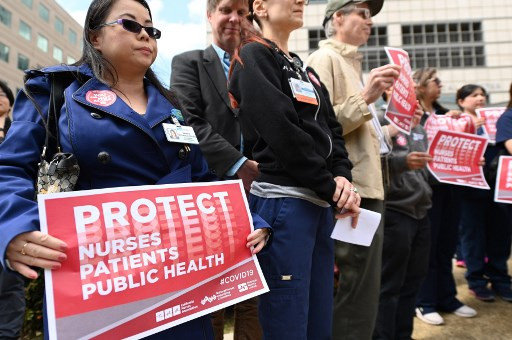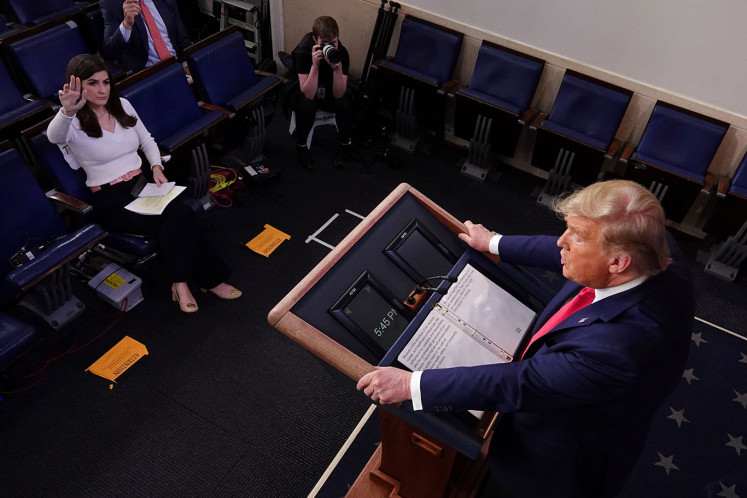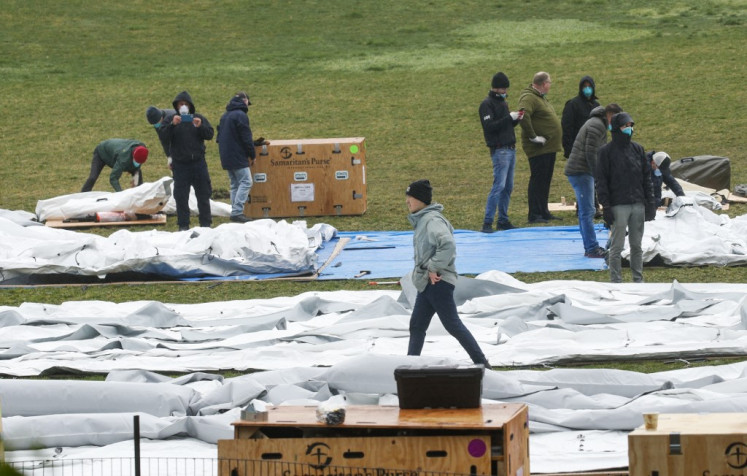Popular Reads
Top Results
Can't find what you're looking for?
View all search resultsPopular Reads
Top Results
Can't find what you're looking for?
View all search resultsTrump rules bar foreign nurses willing to help US
Of the several hundred Philippine recruits now in Vintage’s application process, more than 100 nurses have passed the licensing and language exams. They’ve completed background checks and are ready to head to the US Yet they are stuck because they can’t get their visas processed.
Change text size
Gift Premium Articles
to Anyone
A
s the coronavirus pandemic threatens to strain nursing staffs at hospitals across the US, Melanie N. Beckham knows where to find reinforcements. But first, the Trump administration needs to give its approval.
Beckham, president of Vintage Health Resources in Germantown, Tennessee, specializes in helping hospitals throughout the southeastern US hire nurses from the Philippines, a country with a large population of English speakers and a long history of sending health-care workers abroad.
Of the several hundred Philippine recruits now in Vintage’s application process, more than 100 nurses have passed the licensing and language exams. They’ve completed background checks and are ready to head to the US Yet they are stuck because they can’t get their visas processed.
“They could come tomorrow,” Beckham said. “The demand is overwhelming right now.”
Since President Donald Trump took office on a promise to crack down on immigration, nurses from the Philippines have faced more red tape. Officials return about 50 percent of Vintage’s applications and demand additional paperwork, up from just 5 percent of applications during the Obama administration, Beckham said.
The issue is becoming more urgent by the day because of the spread of Covid-19 cases throughout the US. At more than 104,000 infections, the country now has a higher tally than China and Italy.
“If nurses are infected and become sick, all of us are at greater risk,” National Nurses United, a union with 150,000 members, said in a March 24 statement. “If we are sick, who will take care of patients in the face of this terrifying pandemic?”
Staff Overwhelmed
Some of the hardest hit states are rushing to find reinforcements as their hospital staffs rapidly become overwhelmed. California Governor Gavin Newsom is considering a rule change to speed up licensing of nursing students and New York Governor Andrew Cuomo is appealing for retired nurses to return to the workforce.
One staffing company has received a request for 5,000 nurses in New York, according to Shari Dingle Costantini, president of the American Association of International Healthcare Recruitment. Members of her association have as many as 12,000 nurses from the Philippines and other countries who could fill those jobs, if only they could enter the US, she said.
Workers set up a field hospital in front of Mount Sinai West Hospital inside Central Park on March 29, 2020 in New York City. - A senior US scientist issued a cautious prediction March 29, 2020 that the novel coronavirus could claim 100,000 to 200,000 lives in the United States. Dr. Anthony Fauci, who leads research into infectious diseases at the National Institutes of Health, told CNN that models predicting a million or more deaths were (AFP/Kena Betancur)“We have the nurses with all the credentials and ready to come into the country but they can’t because there are no visas,” she said.
Even before the coronavirus outbreak, many hospitals across the US didn’t have enough nurses to care for patients.
America’s not-for-profit hospitals were “experiencing an extreme nursing shortage,” Moody’s Investors Service said in a 2018 report, “and the added expense pressure and personnel issues will negatively affect hospital margins for at least the next three to four years.”
Southern and western states, including Florida, Georgia, Texas and California, had the most severe problems. Several of those states -- including California -- have worsening shortages amid the virus.
Applications Denied
The US had about 3 million registered nurses in 2018 and the total will grow by more than 12 percent by 2028, according to the Bureau of Labor Statistics, which cited an older population and the increasing rates of chronic conditions like diabetes and obesity as factors contributing to rising demand.
The Philippines could significantly ease the shortage, said Leo-Felix M. Jurado, chair of the Nursing Department at William Paterson University in New Jersey and a board member of the Philippine Nurses Association of America. There are about 150,000 nurses from the Philippines working in the US, he said, up from approximately 120,000 in 2013.
In 2019, about 5,100 people from the Philippines received the EB-3 visas commonly used for nurses, down by a third from 2015.
“It’s absolutely been harder in the Trump administration to get people in,” said Costantini, who is also CEO of Avant Healthcare Professionals, a recruiting company in Florida. US Citizenship and Immigration Services “has been delaying and denying visa applications that were once easily approved.”
A USCIS spokesman said visa wait times vary and that employers have the option to request an expedited application yet that overall processing times are lower compared to 2016.
The State Department appears to be opening the door a little. In a statement dated March 26, it encouraged medical professionals with approved visa petitions or certificates of eligibility in exchange visitor programs, “particularly those working to treat or mitigate the effects of Covid-19,” to seek a visa appointment at their nearest US embassy.
One surgical nurse in Manila has waited for two years. The 32-year-old, who asked not to be identified because of concern about her visa status, earns about 30,000 pesos ($590) a month in the Philippines, not enough to support her family. She has had an offer to work at a US hospital since 2018. Since submitting her paperwork, she has received multiple requests for more documentation.
As a nurse in a major public hospital, she spends her days caring for Covid-19 patients, sometimes with limited protective equipment. She fears the pandemic will tighten health screening requirements and make the visa process even more complicated.
The US isn’t the only country where government policies are making it tough to fill nursing gaps. In the UK, the Brexit vote in 2016 contributed to the loss of thousands of nurses from European Union countries.
“The number of EU nurses coming into the UK suddenly went off a cliff,” said Michael Hodges, a managing director and health care specialist at London-based Christie.
Worldwide Issue
Now the pandemic is hurting British recruiters’ ability to tap countries such as the Philippines. Monica Felix, 32, who arrived in the UK on March 24, received her visa a day before the Philippine government announced a lockdown of Manila. Her trip to Britain included a layover in Dubai, two days before the United Arab Emirates halted flights through the city. Her colleagues at home are worried their moves abroad will be delayed, she said.
“We’re all anxious about what’s happening around us,” Felix said. “All of us know the possible consequences if we get this kind of dreaded disease.”
The Covid-19 crisis is also highlighting a nurses shortage in Australia, estimated to reach 85,000 by 2025 and 123,000 nurses by 2030.
Amid the pandemic, the Australian health regulator is easing licensing rules to get more health workers into the system quickly, including internationally qualified practitioners awaiting bridging visas. Prime Minister Scott Morrison also said the government will relax work restrictions for 20,000 international nursing students.
Shortage at Home
Back in the Philippines, the government wants to keep nurses in the country to help stem the virus outbreak there. Labor Secretary Silvestre Bello has issued an order to strictly regulate the overseas deployment of Filipino health care workers until the pandemic is declared to be under control.
The Philippines lacks about 23,000 nurses, according to Rustico Jimenez, president of the Private Hospitals Association of the Philippines Inc., which has about 900 members. While local hospitals can’t compete with salaries abroad, they will seek to compensate with such perks as free lodging and training programs, he said.
Still, nurses in the countryside make as little as 6,000 pesos a month, according to Leah Paquiz, founder of nursing advocacy group Ang Nars Inc., and many nurses at top hospitals make only 26,000 pesos.
“Despite our problems here, I don’t ever tell nurses not to leave,” she said. “How can we force them stay when we cannot afford to give them better living conditions?”












